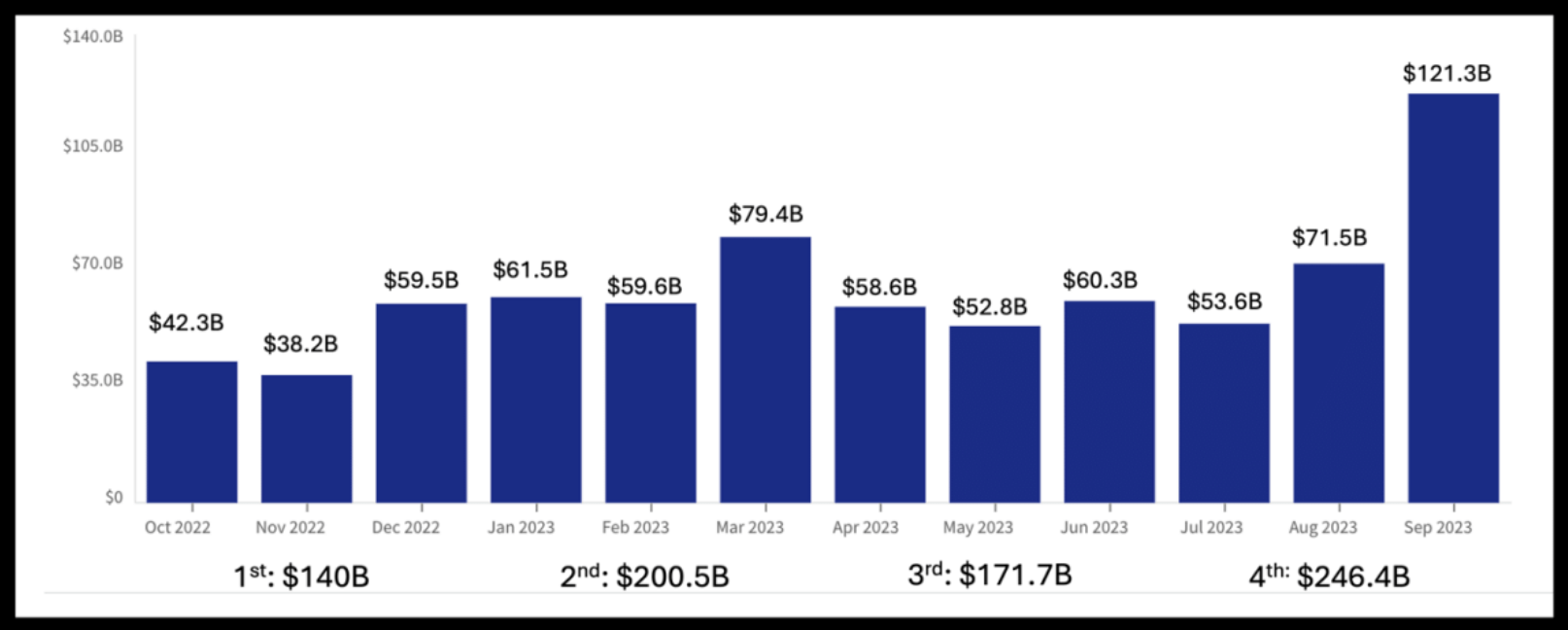The federal fiscal year begins on October 1st and ends on September 30th. The fourth quarter spans July, August, and September.
During fiscal year 2023, $758.6 billion was awarded to businesses, including federal contracts, with $246.4 billion occurring in the fourth quarter. This represents 32.4% of all spending. Ideally, each quarter should account for 25% of the annual spending. However, the fourth quarter presents the greatest opportunity to government contracts. The question is, are you ready to take advantage of the fourth quarter and secure your share of this spending?
The federal government has many programs to support small businesses in winning government contracts, including government IT contracts, federal and state construction engagements, defense projects, defense contract management, and more. One of the most powerful is the Mentor-Protégé Program (MPP).
"Follow the money" is a catchphrase popularized by the 1976 docudrama film All the President's Men, which suggests political corruption can be brought to light by examining money transfers between parties. While the term was popularized in the 1970s, the premise behind the statement has been around for over a century. In Latin, the term Cui bono? means "to whom is it a benefit?"
Juneteenth finds its roots in the aftermath of the American Civil War. On June 19, 1865, Union General Gordon Granger arrived in Galveston, Texas, and proclaimed the end of slavery, two and a half years after the signing of the Emancipation Proclamation. This delay in emancipation reaching Texas is attributed to the limited presence of Union troops and the resistance of slaveholders in the region. The news of freedom was met with joy and jubilation by the African American community, and the day became a symbol of hope and progress.
The Defense Department is taking full advantage of artificial intelligence (AI) to enhance the federal acquisition process. The Chief Digital and AI Office (CDAO) at the DoD has developed a prototype AI tool, called Acqbot, as part of its Tradewind initiative.
Relief for DoD contractors due to inflation may be on the way. The proposed National Defense Authorization Act (NDAA) for 2023, which is Congress' annual budget for the Department of Defense (DoD), includes a provision that would grant the DoD more discretion to allow inflation relief for DoD contractors. The NDAA would amend 50 U.S.C. § 1431 to give the DoD more discretion in allowing adjustments to contracts to account for inflation, although this allowance would only be temporary, lasting from when the NDAA is signed by the President until December 31, 2023.
Teaming and joint venture agreements are powerful tools often utilized by successful businesses in the government market. Although each agreement may seem straightforward, there are significant differences between them. The SBA has recently implemented new rules applicable to both agreements, so contractors should be aware of these essential differences.
In the realm of government contracting, goal setting is not just a strategic advantage—it's a necessity. Whether you're navigating federal procurement or bidding on local city contracts, establishing clear, achievable goals is crucial for success. This article explores why goal setting is so vital in government contracting and the broader business landscape, covering regulations, reliability, and the potential pitfalls of failing to meet commitments.
The Cybersecurity Maturity Model Certification (CMMC) was built to safeguard sensitive unclassified information across the Defense Industrial Base (DIB) by addressing the gaps in prior regulatory requirements.
The new version (CMMC 2.0) focuses on the most advanced cybersecurity standards while minimizing barriers to compliance. Now is the time to start your company’s assessment. As we get closer to implementation it will be more difficult to get the assistance you need.
On December 27, 2021, President Biden signed the FY22 National Defense Authorization Act (NDAA) into law, authorizing nearly $800 billion in defense spending.
The national defense total in the 2022 omnibus spending bill is $782 billion, reflecting a 3.9 percent increase over the administration’s request for 2022 and a 5.6 percent increase over the 2021 appropriations. This total includes $13.6 billion for emergency military and humanitarian aid for Ukraine as Russia’s conflict with the country continues.
Join the GCA Family
Only 22% of federal contracting dollars are awarded to small businesses. Our goal is to be an agent of change by helping businesses owned by women, minorities, and veterans to get their fair share of the opportunities in the government market.











